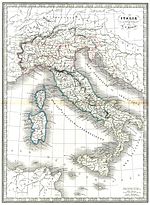
Back Propaganda Due Catalan Propaganda Due Danish Propaganda Due German Propaganda Due Greek Propaganda Due Esperanto Propaganda Due Spanish P2 Finnish Propaganda Due French Propaganda Due Croatian P2 Hungarian
You can help expand this article with text translated from the corresponding article in Italian. (March 2014) Click [show] for important translation instructions.
|
Propaganda 2 (P2) Propaganda Due | |
|---|---|
| Leader | Licio Gelli |
| Founded | 1877 (as Propaganda Massonica) 1966 (as Propaganda Due) |
| Dissolved | 1976 (officially by Grand Orient of Italy) 25 January 1982 |
| Preceded by | Propaganda Massonica |
| Membership | ~962 |
| Ideology | Neo-fascism[1][2] Anti-communism |
| Political position | Far-right |
| Religion | Catholicism |
| National affiliation |
|
| International affiliation |
|
| Part of a series on |
| Freemasonry |
|---|
 |
| History of Italy |
|---|
 |
|
|
Propaganda Due (Italian pronunciation: [propaˈɡanda ˈduːe]; P2) was a Masonic lodge, founded in 1877, within the tradition of Continental Freemasonry and under the authority of Grand Orient of Italy. Its Masonic charter was withdrawn in 1976, and it was transformed by Worshipful Master Licio Gelli into an international, illegal, clandestine, anti-communist, anti-Soviet, anti-Marxist, and radical right[3][4][5] criminal organization and secret society operating in contravention of Article 18 of the Constitution of Italy that banned all such secret associations.[6] Licio Gelli continued to operate the unaffiliated lodge from 1976 to 1984.[7] P2 was implicated in numerous Italian crimes and mysteries, including the collapse of the Holy See-affiliated Banco Ambrosiano, the contract killings of journalist Carmine Pecorelli and mobbed-up bank president Roberto Calvi, and political corruption cases within the nationwide Tangentopoli bribery scandal. P2 came to light through the investigations into the collapse of Michele Sindona's financial empire.[8]
P2 was sometimes referred to as a "state within a state"[9] or a "shadow government".[10] The lodge had among its members prominent journalists, members of the Italian parliament, industrialists, and senior Italian military officers —including Silvio Berlusconi, who later became Prime Minister of Italy; the House of Savoy pretender to the Italian throne Prince Victor Emmanuel;[11] and the heads of all three Italian foreign intelligence services (at the time SISDE, SISMI, and CESIS). When searching Gelli's villa in 1982, police found a document which he had entitled "Plan for Democratic Rebirth", which called for a coup d'etat, the consolidation of the media, the suppression of Italian labor unions, and the rewriting of the Italian constitution.[12]
Outside of Italy, P2 had many active lodges in Venezuela, Uruguay, Brazil, Chile, and Argentina. Among its Argentine members were Raúl Alberto Lastiri, who was briefly interim president of the country after the end of the self-styled "Argentine Revolution" dictatorship (1966–1973); Emilio Massera, who was part of the military junta led by Jorge Rafael Videla during Argentina's last civil-military dictatorship (1976–1983); the Peronist orthodox José López Rega, who was Minister of Social Welfare (1973–1975) and founder of the paramilitary organisation Argentine Anticommunist Alliance (AAA); and former Argentine Army General, Dirty War perpetrator, and convicted murderer Guillermo Suárez Mason.[13]
- ^ Finchelstein, Federico (May 14, 2024). The Wannabe Fascists: A Guide to Understanding the Greatest Threat to Democracy. Univ of California Press. ISBN 978-0-520-39250-2.
- ^ Duthel, Heinz (November 3, 2014). Global Secret and Intelligence Services I: Hidden Systems that deliver Unforgettable Customer Service. BoD – Books on Demand. ISBN 978-3-7386-0771-0.
- ^ Herman, Edward (2002). Manufacturing consent the political economy of the mass media. New York: Pantheon Books. p. 152. ISBN 0307801624.
... the extreme right-wing organization Propaganda Due (P-2), ...
- ^ Naylor, R. T. (2004). Hot money and the politics of debt. Montreal Que: McGill-Queen's University Press. p. 84. ISBN 0773572074.
... [Licio Gelli] organized a special, ultrasecret, ultrarightist lodge, Propaganda-Due
- ^ Bar-On, Tamir (2007). Where have all the fascists gone. Aldershot, England; Burlington, Vermont: Ashgate. p. 39. ISBN 978-0754671541.
... a similar strategy of infiltration within the military milieu by Italian radical right-wing terrorist groups and clandestine elite pressure groups such as Propaganda-Due (P-2) ...
- ^ "Constitution of Italy (English)". December 22, 1947. Retrieved July 5, 2022.
- ^
Gray, David L. (February 4, 2020). The Catholic Catechism on Freemasonry: A Theological and Historical Treatment on the Catholic Church's Prohibition AgainstFreemasonry and its Appendant Masonic Bodies. Belleville, Illinois: Saint Dominic's Media. Inc. p. 122. ISBN 9781732178496. Retrieved April 30, 2023.
In 1976 the Grand Orient of Italy formally seized the charter of P2 and expelled its Worshipful Master, Licio Gelli (a Fascist), who continued to operate P2 as an unaffiliated lodge in Italy until 1984.
- ^ "Masonic lodge affair leaves Italy shocked". The Times. May 23, 1981.
- ^ BBC On This Day: 26 May 1981
- ^ Jones, The Dark Heart of Italy, p. 187
- ^ Hooper, John (June 23, 2006). "The fall of the house of Savoy". The Guardian. Retrieved June 2, 2016.
- ^ Jones, The Dark Heart of Italy, p. 186
- ^ Cite error: The named reference
p12barcowas invoked but never defined (see the help page).
© MMXXIII Rich X Search. We shall prevail. All rights reserved. Rich X Search